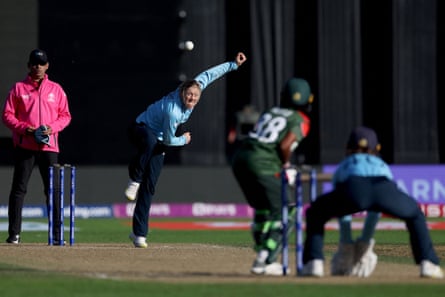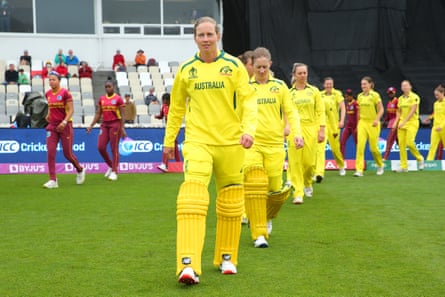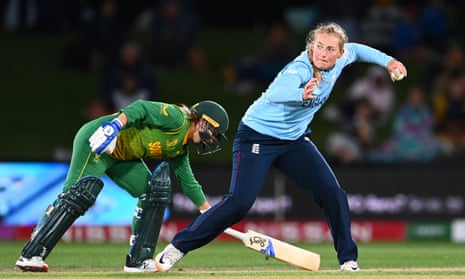Sophie Ecclestone has attributed England’s dramatic turnaround in the World Cup to the leadership of their captain, Heather Knight, and called on her team to “do it for Heather” when they face Australia in the final at Christchurch on Sunday.
Knight was at the helm five years ago when England won the trophy in dramatic fashion at Lord’s, and more recently has marshalled an incredible turnaround, with her team victorious in five must-win matches on the trot after three initial losses put them on the verge of elimination. At the age of 31, it’s possible that Sunday’s match may be her last chance to lead her side out in a 50-over World Cup final.
“To come back the way we have, Heather’s very proud of this group and what we’ve achieved,” Ecclestone said. “As a team, we get on so well. We want the best for each other. So when we go out and play cricket, we do it for each other.
“When we lost three from three, there were a few tears in the changing room. The turning point was a few meetings just to say, we’ve got nothing to lose now, let’s put everything we’re doing at the training ground into a game and go out with no fear, which I think we have done. Hopefully we can go out there on Sunday and do it for Heather.”

Alongside England’s rollercoaster journey, the 22-year-old Ecclestone has experienced something of a personal resurgence during the tournament. The left-arm spinner went wicketless in their opening match against Australia four weeks ago, conceding 77 runs – her worst-ever figures in ODI cricket. But in the weeks since, she has clambered her way to the top of the tournament wicket-taking charts, with 20 scalps in the bag.
The recently issued ICC bowling rankings revealed that she has risen to the No 1 spot in ODIs for the first time, a distinction that sits alongside her existing crown as the world No 1 T20 bowler. Her return of six for 36 in Thursday’s semi-final against South Africa broke the record for most wickets taken by an Englishwoman at a World Cup, overcoming the previous best by Laura Marsh in the 2009 tournament.
“I didn’t have a great day out against the Aussies. To come back the way I did, I’m really proud of myself,” she said. “It’s something I’ve been working hard for, I’ve been trying to get a five-for for a while now. It’s a very proud moment for me and my family.”
Adding to her tally during Sunday’s match would be the icing on the cake for a player who was omitted from England’s 2017 World Cup-winning squad, with the then head coach, Mark Robinson, feeling she should focus on her A-level exams. Instead, she had to watch their triumph at Lord’s from the stands along with 24,000 other fans. “It’s massive for me personally,” she said of this year’s final. “I’ve not won a major trophy yet since I started playing for England, and I’d really love to win one sooner rather than later.”
Amazingly, given the dominance of the two sides in international women’s cricket in recent years (no other team has won a 50-over title since 2000), Sunday will be the first time England have faced Australia in a World Cup final since December 1988. On that occasion, at the MCG, Australia smashed England by eight wickets, chasing their 128-run target with ease. One contemporary account described the Australians as “more athletic and agile in the field, considerably sharper between the wickets … [they] honed batting and bowling skills to a consistently higher level than the majority of opponents”. Much may have changed in women’s cricket since then, but it is a description which could just as easily apply to Meg Lanning’s 2022 team as it did Lyn Larsen’s in 1988.

Australia’s path to the final could not have been more different from England’s. Lanning and co have gone unbeaten across the tournament, doing nothing to dispel their pre-tournament “favourites by a country mile” tag; there is a notion in many quarters that the outcome is a foregone conclusion before the coin is even tossed. Ecclestone, naturally, disagrees: “On our day we can definitely beat the Aussies, and I think we’ve got a great chance to,” she said.
England surrendered the Ashes 12-4 on points in February, but the feeling in the England camp is that their opening World Cup encounter against Australia was a fairer reflection of the way the two sides match up. On that occasion England came within 12 runs of Australia’s mammoth 310-run total, thanks to an unbeaten century from Nat Sciver. Sciver has since had an inconsistent tournament with the bat, but could look to memories of the 2017 final to buoy her before Sunday’s match: her half-century in a low-scoring game at Lord’s was crucial in their nine-run win against India.
Australia, meanwhile, have a chance to seal their reputation as one of the all-time great teams by winning the one piece of silverware that has eluded them of late (they last won the tournament in 2013). When her side were knocked out in the 2017 semi-final courtesy of a Harmanpreet Kaur special, Lanning shed tears in the post-match press conference, in an unusual public display of emotion; a win in Sunday’s match would be the ultimate way to heal those scars.
